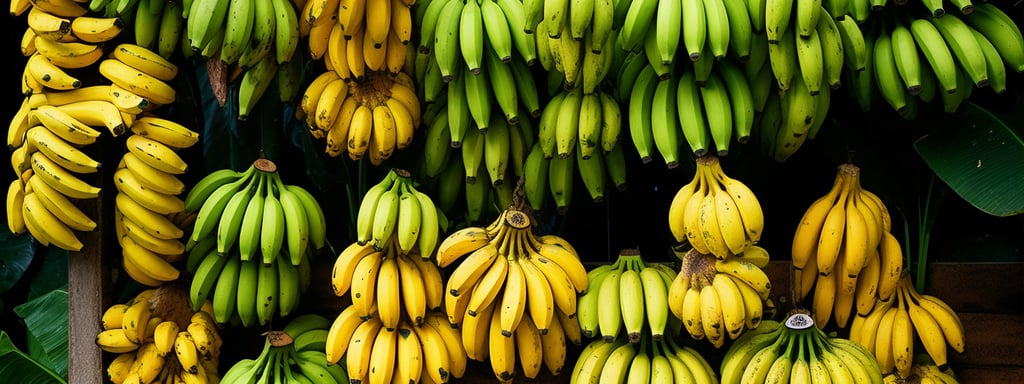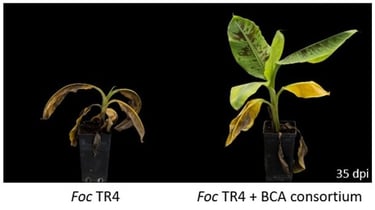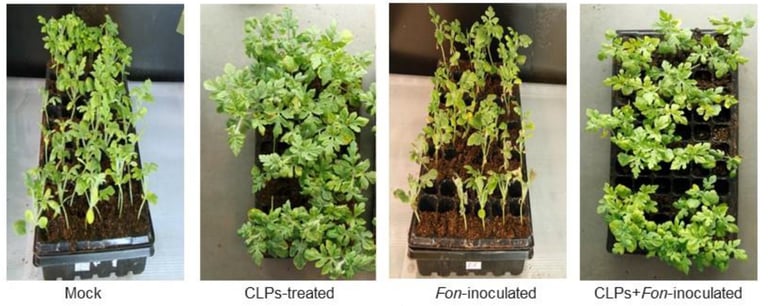Bacillus amyloliquefaciens: A Biological Shield Against Fusarium
2 min read


Bacillus amyloliquefaciens: A Biological Shield Against Fusarium
Fusarium wilt is a nightmare for many crops—persistent, widespread, and notoriously hard to control. While chemical fungicides are commonly used, they’re increasingly coming under scrutiny. One promising biological alternative is gaining traction: Bacillus amyloliquefaciens.
Case Study: Banana Cultivation with B. amyloliquefaciens W19
A breakthrough was achieved in banana farming in China: the W19 strain was applied to the soil as a bio-organic fertilizer—with impressive results:
Fusarium wilt was reduced by up to 44%,
Yields increased by 35% in field trials.
How does it work? Through multiple mechanisms at once:
Lipopeptide compounds (Iturin, Bacillomycin D, Surfactin) directly attack the fungus.
Biofilm formation at the root zone helps beneficial microbes establish themselves.
Production of IAA (a plant hormone) boosts root growth and enhances the plant’s stress resistance.
Additional Evidence: Melon and Cucumber Cultivation
In greenhouse cucumber trials, B. amyloliquefaciens DHA6 suppressed Fusarium oxysporum through lipopeptide production and activation of plant defense genes.
Antioxidative enzymes like catalase and superoxide dismutase were elevated,
Plants showed increased overall resistance.
Field studies in watermelon cultivation, published in Biology & Fertility of Soils, confirmed that a biofertilizer containing B. amyloliquefaciens NJN-6 significantly reduced wilt and improved plant growth.
Mechanisms of Action at a Glance
Direct Antagonism- Lipopeptides destroy fungal hyphae and inhibit spore development
ISR Activation - Defense genes (JA/ET pathways and antioxidants) are triggered
Root Stimulation - IAA and biofilm promote improved nutrient uptake
Microbiome Restructuring - Fusarium is suppressed, beneficial microbes expand


Conclusion: A Biological Powerhouse Instead of Fungicide
Bacillus amyloliquefaciens—with strains like W19, DHA6, and NJN-6—clearly shows that natural soil microbes are not just an alternative, but in many cases outperform chemical fungicides:
Less environmental impact and no residue,
No risk of resistance development,
Works in synergy with the plant’s own defense mechanisms.
Sources:
Biological Control Agents Against Fusarium Wilt of Banana; doi:10.3389/fmicb.2019.00616
Cyclic Lipopeptides of Bacillus amyloliquefaciens DHA6 Are the Determinants to Suppress Watermelon Fusarium Wilt by Direct Antifungal Activity and Host Defense Modulation; https://doi.org/10.3390/jof9060687
Plant Growth-Promoting Rhizobacteria Strain Bacillus amyloliquefaciens NJN-6-Enriched Bio-organic Fertilizer Suppressed Fusarium Wilt and Promoted the Growth of Banana Plants; https://doi.org/10.1021/jf400038z


Innovation & Technology
Probiotic soil activators for sustainable agriculture.
Contact
Newsletter
office@solvaterra.com
© 2025. All rights reserved.
